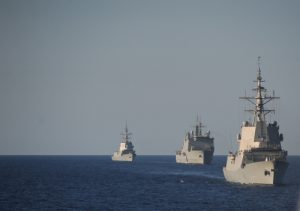
U.S. Sen. Martha McSally (R-AZ) joined a bipartisan group of senators to applaud India’s decision to formally invite Australia as a participant in an annual naval exercise held jointly by the United States and several other democratic nations.
The invitation to Exercise Malabar was made following the recent 2+2 ministerial meeting in Tokyo of the Quadrilateral Security Dialogue, or the Quad, which represents a security forum for like-minded democracies to preserve and promote the rules-based order in the region through shared commitments and collaboration, according to an Oct. 19 letter Sen. McSally and her colleagues sent to Taranjit Singh Sandhu, India’s Ambassador to the United States.
“From an operational perspective, the addition of such a uniquely capable and stalwart partner, like Australia, to this naval exercise is invaluable, providing increased interoperability, strengthening threat assessment abilities and enhancing the maritime roles and missions of the four naval powers,” Sen. McSally and the lawmakers wrote.
Of equal importance, they noted, is the symbolic nature of Australia’s inclusion in Malabar, marking the first time that the U.S., India, Japan, and Australia will engage collectively at the military level since the formation of the Quad and the Quad-plus-Singapore naval exercises held in September 2007.
And bringing in Australia as an exercise participant could help dissuade China’s rising military and economic assertiveness.
“As the world addresses the fallout caused by the COVID-19 pandemic, China has opportunistically looked to expand its military footprint across the IndoPacific,” wrote the senators. “Beijing continues to use methods of intimidation and territorial aggression to test the resolve of regional actors.”
In response to China’s actions, the U.S. has signaled more commitment to the region via the newly proposed Pacific Deterrence Initiative, which would complement the Asia Reassurance Initiative Act by providing a more robust military presence, according to the lawmakers’ letter.
“However, without coordinated efforts among committed and capable partners, solitary actions will not sufficiently address these ever-evolving security challenges,” wrote the senators, who also included U.S. Sens. Marsha Blackburn (R-TN), Thom Tillis (R-NC), David Perdue (R-GA) and Chris Coons (D-DE), among others.



